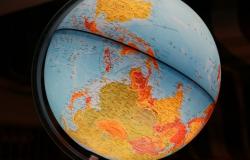A Rose By Any Other Name? In Defence of the “Global South”

Nora Kürzdörfer and Amrita Narlikar call for a recognition of the Global South’s umbrella identity, along with key differentiations within it.
Earlier this year, in the run-up to the Hiroshima Summit, it was reported that the G7 Communique would not use the term the “Global South”. Government sources are reported to have expressed the following view: “referring to emerging and developing nations mainly in the Southern Hemisphere, may give the impression of lumping together countries with diverse circumstances and is therefore considered inappropriate for such a document”. This decision was likely music to the ears of the German foreign policy community, and indeed others in Europe and North America.
There has been no dearth of discussions and articles in recent months, which dismiss the utility of the term, the Global South. Every time someone emphasizes the diversity of countries – and insists that each country from the world-regions be seen in terms of its own, independent interests – others (usually from the “Global North”) cheer and clap delightedly. Even we, as scholars working on and with the regions that the term is supposed to encompass, use air-quotes when we refer to it, in the hope that we won’t be “mansplained” (or what we would call “Westplained”) to – though that seldom deters the great and the good of the policy and think-tank worlds from lecturing to us on the redundancy of the term.
And yes, we’ve heard the critique before. The term Global South has its origins in the Cold War and is thus deemed to be no longer relevant. It brings together countries that are now too vastly different – e.g. diverse economic sizes (least developed countries and emerging markets) as well as differential military capabilities. And oh, “it’s complicated”. We are well aware of these and cognate arguments. And we see why they are occurring louder than ever before – to disaggregate the Global South allows “us” i.e. “the West” to win support for Ukraine. This is not going to work. We suggest four reasons why: intellectual, logical, political and ethical.
First, despite the self-congratulatory tone that often surrounds the “discovery” of the limitations of the Global South as a term, there is little intellectually new or interesting about this debate. Similar concerns were raised with concepts like the “Third World”, “developing countries”, “developing world” and others. Categories are always simplifications, usually serving as useful shorthand. Introducing alternative terms – such as “middle powers”, “regional powers”, “the rest”, “regional, willing or like-minded partners” (to quote the G7), or “global swing states” – will not solve the problem of heterogeneity. But it will likely contribute to an additional problem: at least some of the new terms, such as “global swing states” and “middle powers” fail to recognize real agency on the part of other states and view them as acting solely in relation to Great Powers as per their own narrow interests (in contrast to “seeing” the countries for what they are, and the ideas and experiences that they bring to the negotiating table). Searching for new terms is not the solution.
Second, the debate shows logical inconsistencies. After all, researchers and policy-makers also use simplifications and categorisations when they come to the West or, an actual legal entity, the European Union. The so-called West comprises states at very different living standards, models of development, military expenditures, and cultures. Think also of the deviation of some Member States from the European Union on what are professed to be shared values. Or indeed for how long the UK remained a part of the EU, and then, suddenly was not, due to fundamental divergence in terms of both interests and values. Yet another example is French President Macron’s recent call to reduce Europe’s dependency on the US and staying neutral with regard to the conflict between Taiwan and China. Irrespective of a Trump 2.0 administration, such divisions in the Transatlantic relationship are not going to vanish away. We find it reeking of double-standards when Western countries or the G7 – as a group – claim a cohesive identity for themselves despite their obvious divergences, but refuse to extend a similar courtesy to the Global South. Disagreement on specific issues does not rule out agreement on a shared identity.
Third, a quest by the West to seek individual partners from the world regions – and as sole entities divorced from their other identities – is politically problematic. This is partly because of the incoherence of the West as a group, and also because it denies the possibility from the Global South to act collectively in coalitions. Perhaps recognizing a small island state on its own terms is even well-intended. But simply disaggregating the entire Global South into individual actors with whom the West will deal in a hub-and-spoke model is not only intellectually extremely messy, but also looks like an attempt to deprive the Global South of agency. Note also that while Western policy-makers are at pains to disaggregate the Global South, China is pursuing quite the opposite strategy – often rather effectively. It recognizes developing countries as a group, claims belonging to this group, and then offers seemingly cheap infrastructure, investment and even diplomatic support to this group. Perhaps one should then not be surprised that many countries of the Global South are much more receptive to China – with its embrace of their identity and investment towards it – and resistant to European attempts to divide them.
Fourth, what about ownership of the term by countries of the Global South themselves, and does the West have the moral right to deprive them of this? Whether the West likes it or not, many countries from the world regions do share memories, myths, imaginations, and lived experiences of colonialism, deprivation, and marginalization. Even as some among them rise, almost all of them share a resentment of being excluded from key agenda-setting forums (such as the P-5 group of the UNSC). Moreover, even while policy-makers and think tankers in the West are rejecting the term, countries from the Global South are reclaiming it, as witnessed in the Voice of the Global South Summit, which was organized by India in January 2023. The summit saw the participation of leaders and ministers from 125 countries (and interestingly, did not include China). India has a long history of cooperating with developing countries, and remains committed to doing so even as its power has risen. As such, it has the potential to serve as a bridge between the West and other parts of the Global South. This potential is receiving growing recognition in German and European policy circles. By rejecting the term so absolutely, German and other policy-makers seem to be denying India’s commitment “to amplify the voice of the Global South” and thereby also shooting themselves in the foot.
What should German foreign policy-makers and commentators make of our critique of the critique?
We would suggest that the term “Global South” should be taken for what it is – a useful shortcut to engage with countries that are too often and too easily dismissed as “the rest”. It needs to be used with care to avoid stereotyping and essentialization. As such, the debate on the term may not be quite as problematic as Josep Borrell’s narrative of likening of Europe to a “garden” and the rest of the world to a “jungle”, but it produces a similar outcome of failing to recognize agency. The shared identity of the Global South should be taken seriously, and engaged with as one of the many identities and levels at which countries operate. So for instance, when India or Brazil deal with France or Germany, they do so being fully cognizant of their identities as individual states (for instance in bilateral, strategic partnerships), but also as member countries of the EU. Similarly, it is worth recognizing that Brazil and India are a part of the Global South (parts of which work with China on some issues), members of the BRICS (which involves cooperating with two authoritarian states), and as independent states that may also share some fundamental values with the West.
A recognition of the Global South’s umbrella identity, along with differentiation within, would enable diplomats and other policy-makers to take two important steps. On the one hand, they would be able to better recognize the attraction that authoritarian states exercise. The largesse that China, for instance, is able to deliver in the short term offers benefits for countries in need of immediate and cheap infrastructure. To counter this, an appeal to the interests of the members of the Global South will be necessary. The EU’s Global Gateway project will need to be considerably more ambitious, as will outreach from the US under the Biden administration’s efforts to de-risk from China. On the other hand, Western, liberal governments would also be able to harness the differences more effectively. This would involve moving away from the politically correct cultural relativism that Germany often tends towards, and instead acknowledging that the Global South can include countries whose values are in fact aligned with those of the West, or even go beyond them in terms of their commitment to a fresh liberalism. With regard to commitment to sustainability e.g. there are numerous communities across the Global South that situate animal welfare and animal rights at the centre of environmental protection. Here again, Germany is no role model with is billion Euros meat industry and its large agricultural lobby. At the same time, the Global South undoubtedly also includes countries with values in direct opposition to those that most (but not all) Western leaders will claim to stand for. This means a necessity to stand true to one’s own redlines. For Germany which struggles to end its commitment to “Wandel durch Handel” this also means to not deepen trade with authoritarian states by selling critical infrastructure (such as the port of Hamburg) or by scaling up production in those countries. It means recognizing the security dimension inherent to economic exchange, and acting with the necessary caution and discretion.
For far too long, Western countries have judged large parts of the Global South with other standards than they hold themselves and their peers to account. We were happy to note that Chancellor Olaf Scholz recognized the issue of “double standards” in his speech at the Global Solutions Summit (perhaps he or his speech-writers had read an interview published in this journal earlier this year). Now the next step will be to address these double standards head on. This means moving beyond the narrow discussion of names and terms. Far more important is to start dealing with the countries of the Global South themselves on equal terms, and that includes working with them as a collective or in coalitions (when they so decide). Such exchange could also mitigate the West's surprise at global events and the Global South's responses to them. In other words, engagement with Global South actors matters because they matter. It is time to walk the talk.
Nora Kürzdörfer is a PhD Student at the Berlin Graduate School of Transnational Studies, member of SCRIPTS Cluster of Excellence led by Freie Universität Berlin.
Prof. Dr. Amrita Narlikar is the President of the German Institute for Global and Area Studies (GIGA) and Professor of International Relations at Hamburg University. She also is Honorary Fellow of Darwin College (University of Cambridge), non-resident Senior Fellow at the Observer Research Foundation (ORF), and non-resident Distinguished Fellow of the Australia India Institute in an honorary capacity.
This was first Published in German in Internationale Politik, 28 August, 2023.
This article forms a part of the research project, Transfer for Transformation (T4T), funded by the Leibniz Competition.


